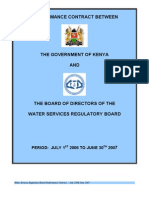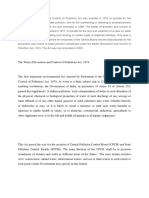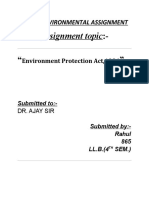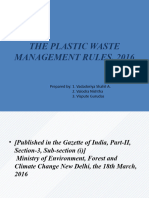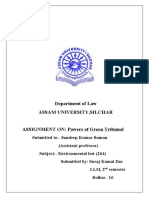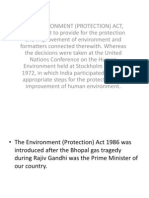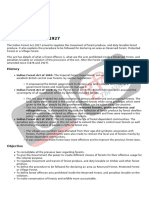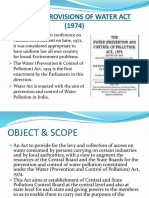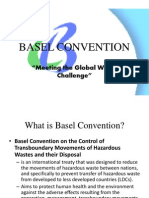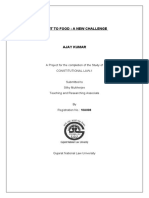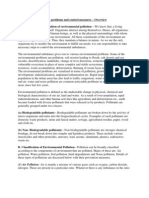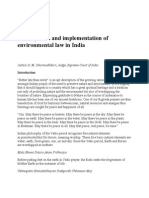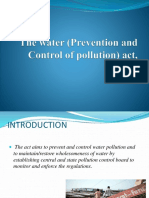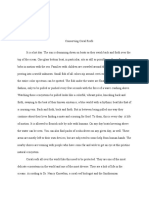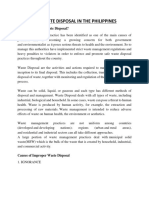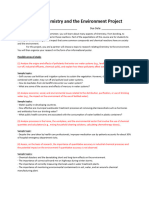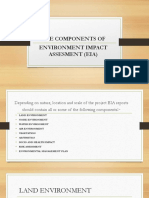Water Act
Uploaded by
Amith AmanWater Act
Uploaded by
Amith AmanSEMINAR
TOPIC: Water Prevention and
Control of Pollution Act
Presented by
Sreenu R Shaji
Department of English
Water Pollution and Control of Pollution Act (1974)
It was enacted in 1974, for the prevention and control of water pollution, and
for maintaining or restoring of wholesomeness of water.
Enacted under the article 252(1)
Pollution under the act includes:-
• Contamination of water
• Alternation in properties of water
• Direct or indirect discharge of sewage and trade effluent into water.
• The discharge cause harmful to public and domestic life.
It provides establishment of central and state board for pollution control. The
act assign power and function to these boards.
The act was emended in 1988. It made renamed Central Pollution Control
Board and State pollution control board as they deal both air and water
pollution.
Water Cess Act was passed in 1977. Amended in 1991.
Central Pollution Control Board State Pollution Control Board
Appoint by central government Appoint by central government
Full time nominated chairman Whole time or part time chairman
5 central government officials 5 State government officials
5 state board members 5 local body members
3 non officials( in trade , fisheries & industry) 3 non officials( in trade , fisheries & industry)
2 representative of central government 2 representative of state government owned
owned company and full member secretary company and full member secretary
Functions of Central Board
To advise central and state government about issues relate to pollution.
To provide technical assistance and guidance.
To carry out investigation and research.
To plan and Oraganise training for person in fields.
To utilize service of media in educating – cause . effect. Prevention. Control
To lay standardization of quality of water.
To establish labourtaries for sample analysis.
Overlook or monitor pollution control in union territories and coordinate work of
state boards.
Functions of State board
To advise state government on matter concerning water pollution.
To plan programme for prevention
To collect and disseminate information to public.
To seek guidance and training of person.
To lay down and modify effluent standards and quality of receiving water.
To evolve economical and trade effluents.
To evolve method for utilization or disposal of treated sewage and effluent.
Powers of Water Act
Every individual obtain consent of State board for the method of treatment,
disposal of sewage, trade effluent into streams or lake.
It has power to obtain information from individual about discharge of water.
To take sample of any sewage or trade effluent.
To enter any premises and inspect any plant.
In any emergency or accident, board can take remedial action.
Board can make application to detect any offence
Under the amended act, the state board can issue direction to any person. In
case of failure to provide information , the person on conviction by court is to
be punished with imprisonment upto 3 months and a fine of 10,000rs.
Conclusion
For effective water protection and prevention from
pollution proper monitoring of both central and state
board activities should be done. It is not only the duty
of some acts or boards but the prior responsibility
held with the public , who has to be responsible for
preserving water for future generation.
You might also like
- MEHF-1-SF-018 Risk Assessment - ASH Loading Through BulkerNo ratings yetMEHF-1-SF-018 Risk Assessment - ASH Loading Through Bulker13 pages
- Functions and Powers of State Pollution Control BoardNo ratings yetFunctions and Powers of State Pollution Control Board1 page
- Hazardous Waste Management Rules 2016 PDFNo ratings yetHazardous Waste Management Rules 2016 PDF18 pages
- Environmental Laws: Presented by Shashikant S NehulNo ratings yetEnvironmental Laws: Presented by Shashikant S Nehul10 pages
- Department of Law Assam University, Silchar ASSIGNMENT ON: Powers of Green TribunalNo ratings yetDepartment of Law Assam University, Silchar ASSIGNMENT ON: Powers of Green Tribunal15 pages
- Bio-Medical Waste Management Rules 2016No ratings yetBio-Medical Waste Management Rules 201637 pages
- Environment Issues and The Judicial ResponseNo ratings yetEnvironment Issues and The Judicial Response68 pages
- Air (Prevention and Control of Pollution)No ratings yetAir (Prevention and Control of Pollution)15 pages
- Environmental Impact Assessment in IndiaNo ratings yetEnvironmental Impact Assessment in India5 pages
- Water (Prevention and Control of Pollution) Act, 1974No ratings yetWater (Prevention and Control of Pollution) Act, 197449 pages
- Class - 33 - Need of Comprehensive Inclusive LawsNo ratings yetClass - 33 - Need of Comprehensive Inclusive Laws18 pages
- Water (Prevention and Control of Pollution)No ratings yetWater (Prevention and Control of Pollution)22 pages
- WRE 2334 - WATER & Environmental Law Lesson 4: Mr. Osimbo MosesNo ratings yetWRE 2334 - WATER & Environmental Law Lesson 4: Mr. Osimbo Moses21 pages
- A Critical Analysis On Growing Significance of Environmental Related Issues in IndiaNo ratings yetA Critical Analysis On Growing Significance of Environmental Related Issues in India16 pages
- Unit 12: Enforcement of Foreign Judgments and Awards: Krishna BhandariNo ratings yetUnit 12: Enforcement of Foreign Judgments and Awards: Krishna Bhandari11 pages
- Right To Food: A New Challenge: A Project For The Completion of The Study of Constitutional Law-1No ratings yetRight To Food: A New Challenge: A Project For The Completion of The Study of Constitutional Law-115 pages
- Air Pollution: Air Is Mainly A Mixture of Various Gases Such As Oxygen, Carbon DioxideNo ratings yetAir Pollution: Air Is Mainly A Mixture of Various Gases Such As Oxygen, Carbon Dioxide14 pages
- Environmental Protection and Ecological Development-Global and InternationalNo ratings yetEnvironmental Protection and Ecological Development-Global and International48 pages
- Vellore Citizens Welfare Forum Vs Union of IndiaNo ratings yetVellore Citizens Welfare Forum Vs Union of India25 pages
- Development and Implementation of Environmental Law in IndiaNo ratings yetDevelopment and Implementation of Environmental Law in India25 pages
- A Review of Polluter-Pays Principle (PPP) in India's Environmental Law and PolicyNo ratings yetA Review of Polluter-Pays Principle (PPP) in India's Environmental Law and Policy7 pages
- The Water (Prevention and Control of Pollution ACT 1974100% (1)The Water (Prevention and Control of Pollution ACT 197417 pages
- Environmental Laws Sem 2 Shreyas Bandgar Roll No 157No ratings yetEnvironmental Laws Sem 2 Shreyas Bandgar Roll No 15713 pages
- Prosiding - Dadang Subarna - PSTA - 2016No ratings yetProsiding - Dadang Subarna - PSTA - 20169 pages
- Current Ecological Status and Identification of Potential Ecologically Sensitive Areas in The Northern Western GhatsNo ratings yetCurrent Ecological Status and Identification of Potential Ecologically Sensitive Areas in The Northern Western Ghats179 pages
- Battery Top Up Water - Safety Data SheetNo ratings yetBattery Top Up Water - Safety Data Sheet5 pages
- Analytical Task (Nadya Rovin Putri XI IPS 2)No ratings yetAnalytical Task (Nadya Rovin Putri XI IPS 2)3 pages
- Improper Waste Disposal in The PhilippinesNo ratings yetImproper Waste Disposal in The Philippines3 pages
- FLOW-3D HYDRO - Water & Environmental Brochure - StampedNo ratings yetFLOW-3D HYDRO - Water & Environmental Brochure - Stamped4 pages
- Moisture Content: Abubakar Tafawa-Balewa University, Bauchi. Civil Engineering ProgrammeNo ratings yetMoisture Content: Abubakar Tafawa-Balewa University, Bauchi. Civil Engineering Programme10 pages
- Vidyut SahayakJunior Engineer EnvironmentNo ratings yetVidyut SahayakJunior Engineer Environment12 pages
- Strategies For Conserving Biodiversity in Context of Nepalese DevelopmentNo ratings yetStrategies For Conserving Biodiversity in Context of Nepalese Development20 pages
- SCH3U: Chemistry and The Environment ProjectNo ratings yetSCH3U: Chemistry and The Environment Project2 pages
- An Overview of The Historical Context For Sustainable Business in The United StatesNo ratings yetAn Overview of The Historical Context For Sustainable Business in The United States15 pages
- Components of Environmental Impact Assesment (Eia)No ratings yetComponents of Environmental Impact Assesment (Eia)11 pages
- Chapter 37: Communities and Ecosystems: Energy Flow and Chemical CyclingNo ratings yetChapter 37: Communities and Ecosystems: Energy Flow and Chemical Cycling6 pages
- MEHF-1-SF-018 Risk Assessment - ASH Loading Through BulkerMEHF-1-SF-018 Risk Assessment - ASH Loading Through Bulker
- Functions and Powers of State Pollution Control BoardFunctions and Powers of State Pollution Control Board
- Environmental Laws: Presented by Shashikant S NehulEnvironmental Laws: Presented by Shashikant S Nehul
- Department of Law Assam University, Silchar ASSIGNMENT ON: Powers of Green TribunalDepartment of Law Assam University, Silchar ASSIGNMENT ON: Powers of Green Tribunal
- Water (Prevention and Control of Pollution) Act, 1974Water (Prevention and Control of Pollution) Act, 1974
- WRE 2334 - WATER & Environmental Law Lesson 4: Mr. Osimbo MosesWRE 2334 - WATER & Environmental Law Lesson 4: Mr. Osimbo Moses
- A Critical Analysis On Growing Significance of Environmental Related Issues in IndiaA Critical Analysis On Growing Significance of Environmental Related Issues in India
- Unit 12: Enforcement of Foreign Judgments and Awards: Krishna BhandariUnit 12: Enforcement of Foreign Judgments and Awards: Krishna Bhandari
- Right To Food: A New Challenge: A Project For The Completion of The Study of Constitutional Law-1Right To Food: A New Challenge: A Project For The Completion of The Study of Constitutional Law-1
- Air Pollution: Air Is Mainly A Mixture of Various Gases Such As Oxygen, Carbon DioxideAir Pollution: Air Is Mainly A Mixture of Various Gases Such As Oxygen, Carbon Dioxide
- Environmental Protection and Ecological Development-Global and InternationalEnvironmental Protection and Ecological Development-Global and International
- Development and Implementation of Environmental Law in IndiaDevelopment and Implementation of Environmental Law in India
- A Review of Polluter-Pays Principle (PPP) in India's Environmental Law and PolicyA Review of Polluter-Pays Principle (PPP) in India's Environmental Law and Policy
- The Water (Prevention and Control of Pollution ACT 1974The Water (Prevention and Control of Pollution ACT 1974
- Environmental Laws Sem 2 Shreyas Bandgar Roll No 157Environmental Laws Sem 2 Shreyas Bandgar Roll No 157
- Current Ecological Status and Identification of Potential Ecologically Sensitive Areas in The Northern Western GhatsCurrent Ecological Status and Identification of Potential Ecologically Sensitive Areas in The Northern Western Ghats
- FLOW-3D HYDRO - Water & Environmental Brochure - StampedFLOW-3D HYDRO - Water & Environmental Brochure - Stamped
- Moisture Content: Abubakar Tafawa-Balewa University, Bauchi. Civil Engineering ProgrammeMoisture Content: Abubakar Tafawa-Balewa University, Bauchi. Civil Engineering Programme
- Strategies For Conserving Biodiversity in Context of Nepalese DevelopmentStrategies For Conserving Biodiversity in Context of Nepalese Development
- An Overview of The Historical Context For Sustainable Business in The United StatesAn Overview of The Historical Context For Sustainable Business in The United States
- Components of Environmental Impact Assesment (Eia)Components of Environmental Impact Assesment (Eia)
- Chapter 37: Communities and Ecosystems: Energy Flow and Chemical CyclingChapter 37: Communities and Ecosystems: Energy Flow and Chemical Cycling

